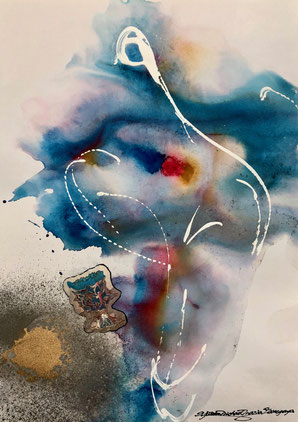
「美」
美とは、そのものが放つ美しさがまず第一である。
見れば迫り、訴えてくるその物の存在ごとの臨場感。
受け取る側は、そういう本能に訴える感覚をまずは大事にしなくてはいけない。
その次に、考えて分かる美しさがくる。
分かるものをもっと分かるように、また、分からないものをちゃんと分かるように、言葉で自分を納得させる作業だ。
そこがスッキリいくと作品に理性的な美しさが加わる。
しかし私にとっては、難しく考えないとわからないような美しさなどまやかしだ。
美しいものは、その存在が存在ごと美しい。
それ以上でもそれ以下でもない。
たとえそれが常識の秤にかけて、いびつであっても、変であっても、美しいのだ。
目の前に美しいものがあるのに、それが異質であるために、分からない、分からない、という人は、目の前の美しさに鈍感なことが多い。
異質さに囚われて、そのものの美しさを感じていない事がほとんどである。
頭で理解しないと不安なので、美しくないという。
つまり、そういう人は、考えて分かる美しさしか受け取れないのである。
見れば美しさが伝わっているのに、頭で分からないからその美しさを保留したり、拒絶する。
そういう考えでは、美の本質には一向に近付けないだろう。
逆に、形などには囚われず何でも受け止める人には、日常生活は本質的な美の連続である。
"Beauty"
Beauty is the beauty that it emits first.
If you look at it, you will feel the presence of the thing that appeals to you.
The recipient must first value the feeling of appealing to such instincts.
Next comes the beauty that you can think of.
It's a task to convince yourself with words so that you can understand more what you understand and what you don't understand.
When that is refreshed, rational beauty is added to the work.
But for me, the beauty that I can't understand without thinking hard is deceptive.
Beautiful things are beautiful because of their existence.
More even no less.
Even if it's weighed by common sense, it's beautiful, whether it's distorted or weird.
People who have something beautiful in front of them but don't understand it because it is foreign are often insensitive to the beauty in front of them.
In most cases, they are trapped in foreignness and do not feel the beauty of themselves.
He says it's not beautiful because he's anxious if he doesn't understand it in his head.
In other words, such a person can only receive the beauty that can be thought of.
We can see the beauty, but we don't know it in our heads, so we withhold or reject it.
With that in mind, the essence of beauty cannot be approached at all.
On the contrary, for those who accept anything without being bound by shape, everyday life is an essential continuum of beauty.
